The Metaverse: Hospitality Now & in the Future
General discussions around the benefits the metaverse can bring have been building for a while now, with a recent survey from KPMG showing that over a third of UK consumers were optimistic about its future. The ability to connect with people when you aren’t physically in the same place has multiple applications of course, something which hospitality brands and designers alike have been exploring. Following on from the launch of LEVEN, a real-world hotel in Manchester by Wellbrook Hospitality and Branco Capital at the end of 2021, a plot of virtual land has been acquired to create a second site in what has been branded the ‘LEVENverse’.
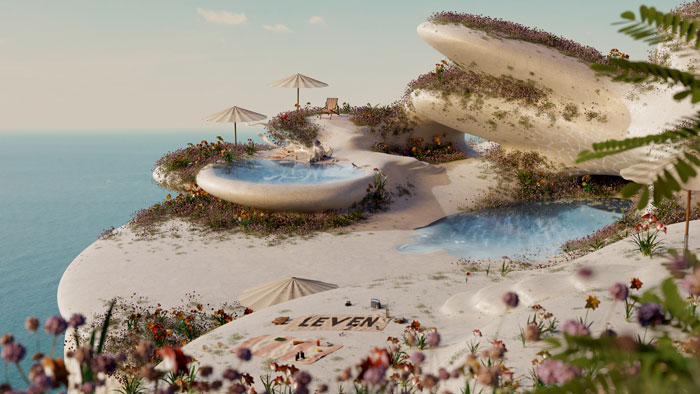
LEVENverse Terrace
“As the virtual world, whether the Metaverse, VR or AI, evolves and continues to embed within our real world reality, every industry disrupted by this new digital era will feel its impact,” says Timothy Griffin, Principal, Wellbrook Hospitality and Co-Founder, LEVEN “By bringing our physical spaces to the Metaverse we can create a digital amenity space for our customers who are spending more and more time in varying degrees of virtual worlds, whether for gaming, social or work reasons. For our brand to retain integrity in the virtual world, it was important for our brand values, including our approach to design, to traverse both our physical and virtual spaces.”
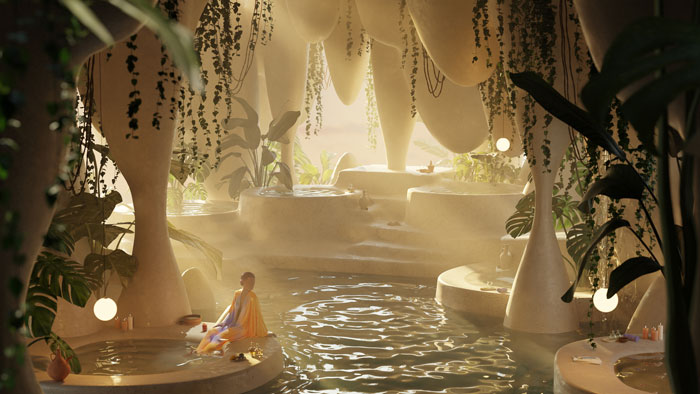
LEVENverse Baths
Users can create their own social and game experiences within this virtual hotel environment, which will also feature commissioned NFTs and creative digital experiences. The brand is currently exploring integrating cryptocurrency payments, enabling Bitcoin payment in both IRL and AFRL locations.
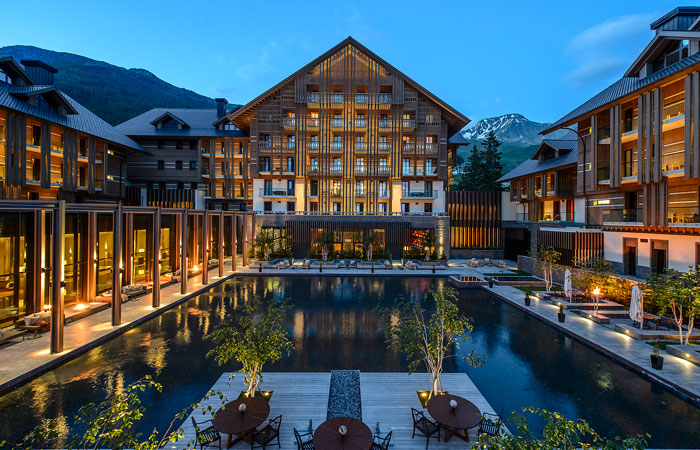
The Chedi Andermatt designed by Jean-Michel Gathy, head of Kuala Lumpur architecture firm Denniston
Staying further afield momentarily, future-facing ways to pay was something 5-star property The Chedi Andermatt embraced in summer 2022 becoming the first Swiss hotel to accept payments in cryptocurrency. In a bid to attract a new generation of digital natives and a younger clientele, guests at the luxury hotel designed by Jean-Michel Gathy, head of Kuala Lumpur architecture firm Denniston can pay in Bitcoin and Ethereum, two of the most widely used cryptocurrencies. Now the location, which mixes a traditional chalet vernacular with Gathy’s modern symmetrical ethos, partnered with payment service company Worldline to create a showroom in the metaverse, allowing avatar travellers to book exclusive packages for future (IRL) stays at the hotel. Commenting on the move to the metaverse, general manager Jean-Yves Blatt said:
“Now more than ever, the metaverse answers a need from discerning travellers seeking new and innovative experiences after over two years of travel restrictions. Not only does the introduction elevate our guests’ booking experience with a 3D showroom, but also incorporates an extra layer of practicality as the offers can be reserved with cryptocurrencies. Plus, for international guests, avoiding ever-fluctuating exchange rates and transfer fees, by paying directly with Bitcoin or Ethereum, is also incentivising.”
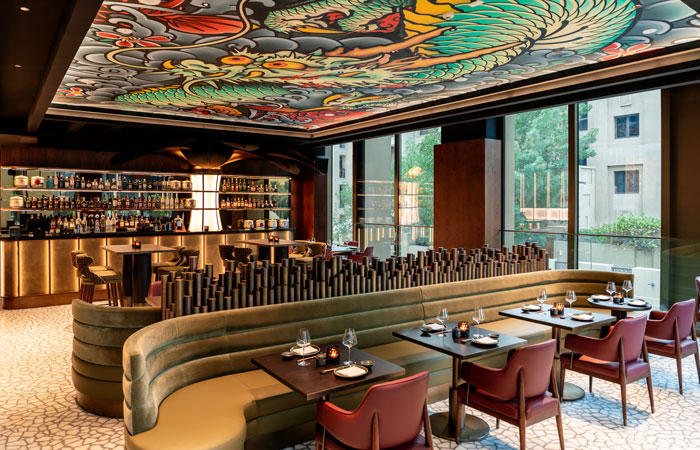
DesignLSM, Sumosan-Dubai
Holly Hallam, managing director at DesignLSM, a Brighton-based multi-disciplined creative studio that specialises within the hospitality industry, shares her experience, “I have witnessed firsthand how technology has become a driving force in shaping the future of hospitality, helping to elevate guest experiences whilst aiding workforces to stay better connected and be operationally effective.”
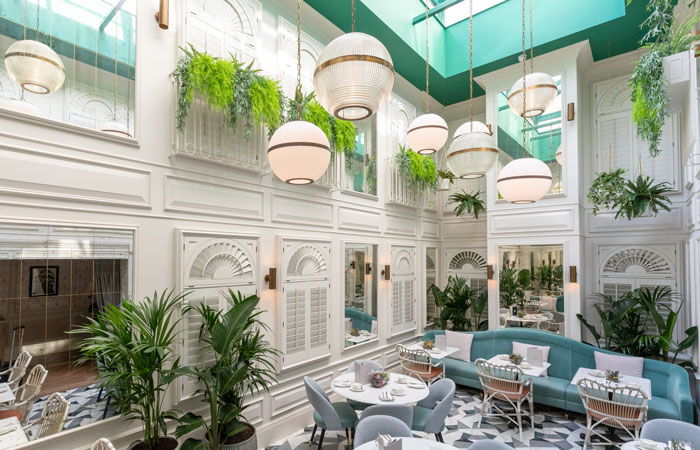
DesignLSM, 100 Queensgate
She talks about the adoption of contactless technology such as mobile check-ins, digital key cards, and voice-activated controls for in-room amenities, adding “The ‘Internet of Things (IoT)’ has brought a new dimension to the hospitality experience.”
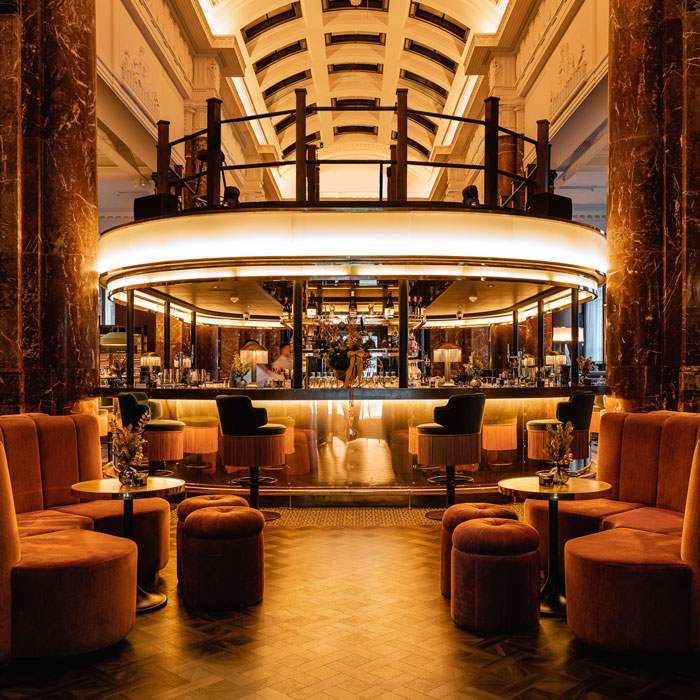
DesignLSM, Gaucho, Liverpool
As well as in-room convenience she cites how the IoT “assists hotel operators in predictive maintenance and energy efficiency, leading to cost reduction and improved sustainability.” AI and machine learning, meanwhile, is another game changer in the hospitality arena she adds, pointing to AI-powered chatbots and virtual assistants providing round-the-clock customer service, addressing queries promptly and efficiently “It doesn’t stop there!” she continues, “Machine learning algorithms are analysing guest preferences and behaviours, allows hotels to deliver bespoke experiences and targeted recommendations. This level of personalisation not only allows businesses to build a much deeper understanding of the guest by gathering a vast pool of data, but it’s found to be improving customer satisfaction and the likelihood of repeat bookings by offering an experience that is more tailored to the individual needs.”

Citizen M in partnership with advertising agency KesselsKramer London and AI director Ai.s.a.m
The Citizen M hotel group, which was launched in 2008 and now has a portfolio which stretches across Europe (including four London sites) and North America took a lighthearted view of AI, recently partnering with advertising agency KesselsKramer London, and AI director Ai.s.a.m to produce a film was created entirely with AI generated video. The result is a glitchy pastiche of an outdated luxury hotel featuring cloned concierges, ghoulish guests, warped shower scenes and out-of-this-world buffets.
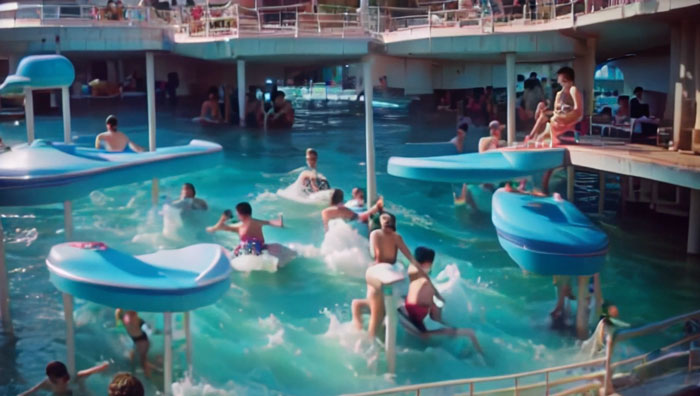
Citizen M in partnership with advertising agency KesselsKramer London and AI director Ai.s.a.m
Citizen M have run with the idea of anxiety around the future of AI and decided instead to have some fun with it: to change the narrative. Its USP has always been tech-orientated to a degree with the provision of an in-room tablet to control elements such as room temperature, lighting and blinds. But as chief brand officer, Robin Chadha puts it, “We want to encourage people to look past the dreary realm of AI-generated mediocrity and step into the vibrant embrace of a citizenM hotel, where genuine human connection awaits, courtesy of our warm and welcoming ambassadors.”
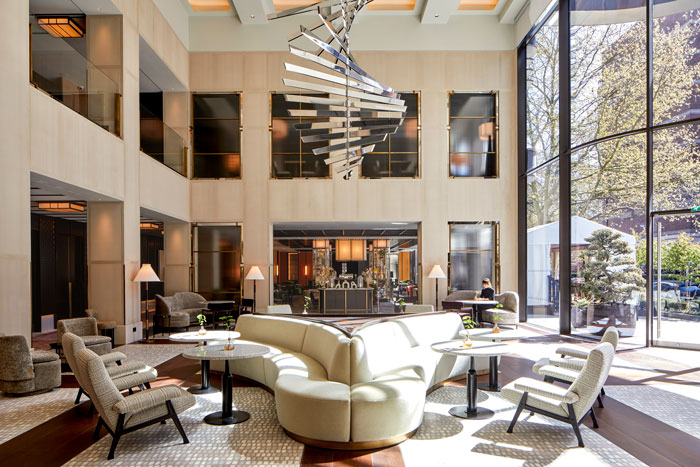
David Collins Studio
Joseph Troughton, associate with David Collins Studio makes a serious point about the role of technology in hospitality adding, “’Considered’ is the approach we take. We’re always thinking what benefit it brings. We have a timeless approach to design, you’ll see that throughout our projects, and technology has to weave into that; it’s very hidden, never obvious.” He talks about a kinetic sculpture by British artist Ivan Black, which hangs in the centre of the double height lobby at Nobu Hotel Portland Square, and spins slowly at all times. And while he has a pet hate of in-room screens, Troughton is a big advocate of tech in the design process itself, “Putting VR goggles on is a great thing. We use them from early concept stage where you get to understand the space. When clients are virtually walking through the space, they bring their expertise about their customers, and it really does give much sharper feedback which is really constructive, and helpful in enabling that design to then progress.”
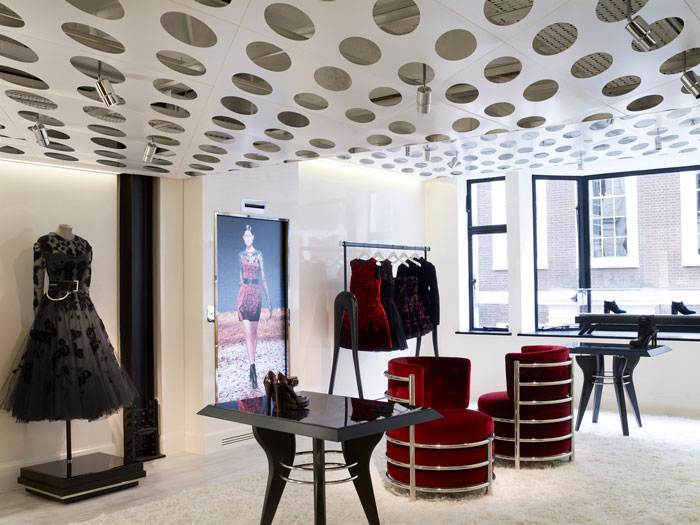
David Collins Studio
Looking to the future and letting his imagination run wild a little Troughton adds, “The thing that excites me the most is augmented reality. You could have artwork that’s forever evolving. There could be a digital element on someone’s wearable tech to channel an image or how the space looks according to the time of year or their personal preferences; personalisation is absolutely key in hotels. This type of technology can also help to extend the life of interior design projects as the space could appear different each time, without stripping out and starting again.”
“There’s no doubt that technology will continue to seamlessly integrate with design to create unparalleled experiences” says Design LSM’s Holly Hallam, “This can include everything from offering lifelike VR excursions to famous landmarks and real-time access to global concerts and shows from the comfort of their room, to implementing creative robotic inventions that attend to room service requests.”
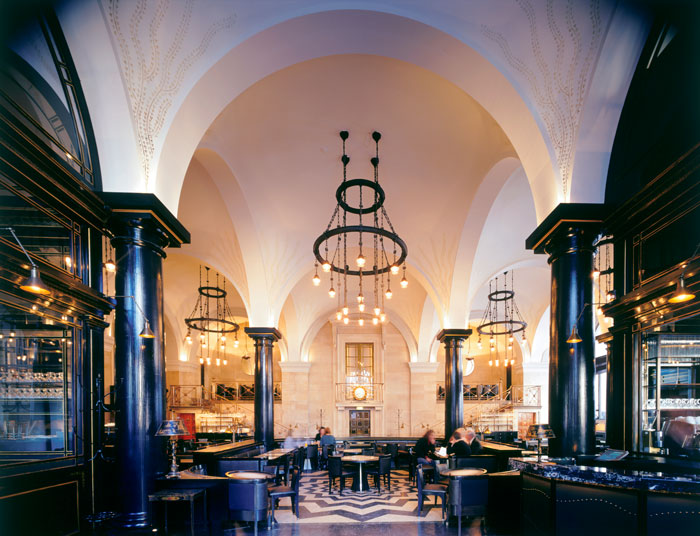
David Collins Studio
Timothy Griffin sums the situation up neatly, “Tech, great design and customer service are all pillars and hallmarks of an inspired hospitality experience. Each of these in isolation are important, however if all three are executed well together – you’ve hit the jackpot!”




